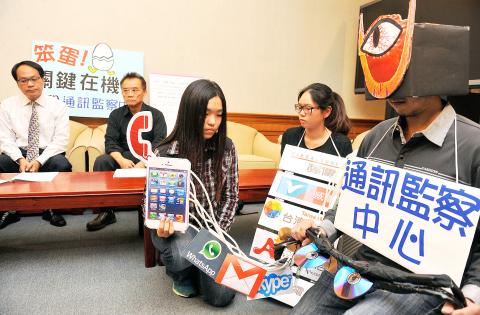The two communications surveillance centers at the heart of what critics call the government’s rampant abuse of wiretapping should be abolished immediately, the Judicial Reform Foundation said yesterday.
The centers, which were established in the 1990s, pose a threat to freedom of speech, foundation members said at a Taipei press conference held with National Chiao Tung University students.
“The severity of the government’s wiretapping abuse problem has been greatly underestimated. We believe the root cause of the problem is the government’s two communications surveillance centers and we plan to push for an amendment to the Communication Security and Surveillance Act [通訊保障及監察法] to disband them,” foundation executive director Lin Feng-jeng (林峰正) said.

Photo: Chien Jung-fong, Taipei Times
Citing government statistics, Lin said that prosecutors had on average applied for court approval for 15,000 wiretaps each year over the past five years, about 5.6 times the number of wiretap applications filed in the US and 520 times that seen in Japan.
Taking population sizes into account, the statistics showed that about 0.044 percent of the nation’s population of 23 million are monitored by the government annually, which is 50 times higher than the rate in the US and more than 1,900 times that in Japan, Lin said.
National Chiao Tung University electrical engineering professor Su Yu-ted (蘇育德) said the centers were founded “stealthily” by the government in 1992, with one affiliated to the Ministry of Justice’s Investigation Bureau and the other with the Ministry of the Interior’s National Police Agency.
Su said the wiretapping agencies had been deemed illegitimate in the past, but had been made legal.
“However, since 2000, all telecommunication operators have been required to set up transmission lines within the centers’ control rooms. This means that the communications of every citizen in this country go through the centers and are therefore subject to government surveillance,” Su said.
Greg Yo (尤伯祥), a member of the foundation’s executive committee, said the “September political strife” not only put the issue of the government’s wiretapping abuse on the table, but also proved that George Orwell’s “Big Brother” in his novel 1984 is not just a nightmare, but is alive now in Taiwan.
The strife Yo referred to erupted when it emerged that the Special Investigation Division of the Supreme Prosecutors’ Office illegally tapped the cellphone of Democratic Progressive Party caucus whip Ker Chien-ming (柯建銘) and the legislature’s switchboard. The division was probing Legislative Speaker Wang Jin-pyng (王金平) for allegedly improperly lobbying for Ker in a breach of trust case, claims which resulted in the Chinese Nationalist Party’s (KMT) Central Evaluation and Discipline Committee revoking the speaker’s membership.
“The wiretapping abuse has led to an unlimited expansion of the government’s powers. The existence of the two centers is unconstitutional because they are a threat to the public’s basic rights of freedom of speech,” Yo said.
Yo urged the public to dedicate more attention to the issue and join the foundation’s calls for the centers’ abolishment.

Aftershocks from a magnitude 6.2 earthquake that struck off Yilan County at 3:45pm yesterday could reach a magnitude of 5 to 5.5, the Central Weather Administration (CWA) said. Seismological Center technical officer Chiu Chun-ta (邱俊達) told a news conference that the epicenter of the temblor was more than 100km from Taiwan. Although predicted to measure between magnitude 5 and 5.5, the aftershocks would reach an intensity of 1 on Taiwan’s 7-tier scale, which gauges the actual effect of an earthquake, he said. The earthquake lasted longer in Taipei because the city is in a basin, he said. The quake’s epicenter was about 128.9km east-southeast

The Taipei Summer Festival is to begin tomorrow at Dadaocheng Wharf (大稻埕), featuring four themed firework shows and five live music performances throughout the month, the Taipei Department of Information and Tourism said today. The festival in the city’s Datong District (大同) is to run until Aug. 30, holding firework displays on Wednesdays and the final Saturday of the event. The first show is scheduled for tomorrow, followed by Aug. 13, 20 and 30. To celebrate the 30th anniversary of Disney Pixar's movie Toy Story, the festival has partnered with Walt Disney Co (Taiwan) to host a special themed area on

BE CAREFUL: The virus rarely causes severe illness or death, but newborns, older people and those with medical conditions are at risk of more severe illness As more than 7,000 cases of chikungunya fever have been reported in China’s Guangdong Province this year, including 2,892 new cases last week, the Centers for Disease Control (CDC) yesterday said it is monitoring the situation and considering raising the travel notice level, which might be announced today. The CDC issued a level 1 travel notice, or “watch,” for Guangdong Province on July 22, citing an outbreak in Foshan, a manufacturing hub in the south of the province, that was reported early last month. Between July 27 and Saturday, the province reported 2,892 new cases of chikungunya, reaching a total of 7,716

The New Taipei City Government today warned about the often-overlooked dangers of playing in water, and recommended safe swimming destinations to cool off from the summer heat. The following locations in the city as safe and fun for those looking to enjoy the water: Chienshuiwan (淺水灣), Baishawan (白沙灣), Jhongjiao Bay (中角灣), Fulong Beach Resort (福隆海水浴場) and Sansia District’s (三峽) Dabao River (大豹溪), New Taipei City Tourism and Travel Department Director-General Yang Tsung-min (楊宗珉) said. Outdoor bodies of water have variables outside of human control, such as changing currents, differing elevations and environmental hazards, all of which can lead to accidents, Yang said. Sudden